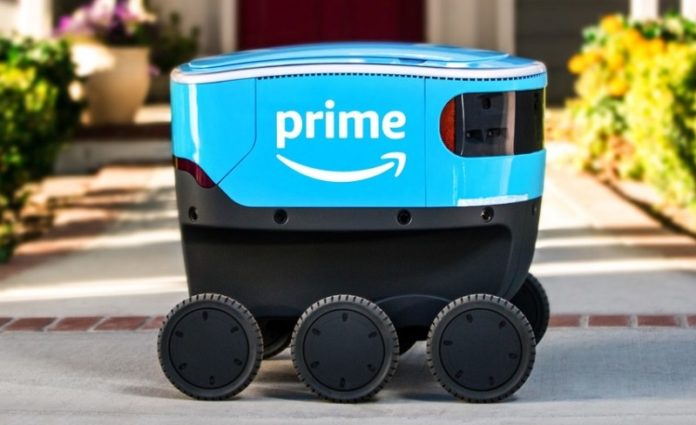Meet Scout.
It weighs about 100 pounds.
It has six wheels.
It’s already a celebrity.
And it may be coming to your Kansas neighborhood soon.
In what reflects an ongoing legislative battle pitting regulation against new technology, Amazon is lobbying lawmakers for a bill easing the way for its new robotic delivery vehicle – Scout.
The international e-commerce giant is asking the Legislature to allow the automated delivery vehicles to travel on city sidewalks and roads as they deliver packages to your home.
The bill also would bar local governments from regulating them, a point that is already causing heartburn for some lawmakers.
The legislation is drawing opposition from cities and counties who say the bill doesn’t pay enough attention to public safety.
Amazon has already deployed the vehicles in two markets: Irvine, California; and suburban Seattle.
The company is now looking for “innovation-friendly neighborhoods” elsewhere to deploy what it considers another option for last-mile deliveries.
Kansas, where Amazon employs more than 3,000 people at four facilities, is one of those states.
“We love to have Scout deployed in locations where customers want it,” said Jennie Massey, Amazon’s senior public policy manager.
“If there’s a municipality that doesn’t want Scout, we certainly wouldn’t want it to go there,” Massey told the Senate Commerce Committee Wednesday.
A labor union also has weighed in against the bill, suggesting Scout might replace delivery workers – an argument Amazon disputes.
“That is not the case at all,” Massey said. “Amazon continues to hire thousands of truck drivers and will continue to use traditional truck delivery.”
More wonkishly known as a “personal delivery device,” Scout is the size of an ice cooler and travels at about 3 mph – a walker’s pace.
An Amazon van drops off the delivery robots in the neighborhood where deliveries are scheduled.
The electrically-powered vehicles primarily run on neighborhood sidewalks, although they can reroute onto the road if they encounter obstacles.
While the vehicle is equipped with sensors so it can dodge sidewalk hurdles, Massey conceded the delivery robot is not suited for every neighborhood, especially those without sidewalks.
The robot recently became a pop star when it appeared on “Ellen.” The host and the television audience reacted as if it were a cuddly pet.
“Aw, look at that. Precious,” host Ellen DeGeneres said as the robot rolled out on stage to make a delivery. “He’s excited to see me.”
But don’t be fooled by the cuteness, the cities warned.
“These are not sentient creatures,” said Erik Sartorius, executive director of the League of Kansas Municipalities. “They have sensors and programming. They look really cool.”
But what happens when technology gives way to danger?
“When one of these things runs into a person and injures them, what will happen?” he asked. “We don’t believe there’s any law for us to enforce.”
The bill would set out these operating rules for Scout:
- It could run on sidewalks or crosswalks.
- It could run on a city street but only for accessing a sidewalk.
- It would have to yield to all vehicles.
- It would have lighting visible for 500 feet in clear weather.
- It couldn’t interfere with traffic.
- It would have to comply with traffic signals.
- It could operate at no more than 6 mph.
- It would carry insurance for $100,000 in damages.
- It must display contact information of the operator.
- It must be equipped with a system that allows a controlled stop.
- It can only cross the street at a marked crosswalk or an unmarked crosswalk at an intersection.
- They are not considered a motor vehicle under Kansas law.
The bill also would restrict local governments from regulating the vehicles.
Cities would not have the ability – under the initial version of the bill – to keep Amazon from deploying the vehicles in their community.
But Sartorius noted that the bill was open-ended in so many ways that it could put the public at risk.
He called the requirements in the bill “minimal.”
He said the bill does not set limits for how much weight it can carry, nor does it spell out reporting requirements if there were a crash.
He added that there are no penalties in the bill for violations.
“Essentially, this is eight pages of goals and aspirations in terms of what can be enforced,” Sartorius said.
“There are no penalties in this bill – either at the local level or at the state level – for ignoring anything in this legislation,” he said.
“If there is not some type of penalty provision…again it’s hopes and wishes,” he said. “You’re not enacting something that can be adhered to or have to be adhered to.”
Republican Sen. Gene Suellentrop questioned Sartorius about whether the Amazon vehicles were any more dangerous than the battery-powered cars children drive in neighborhoods.
“I’ve got a half a dozen of them up and down my street. They’re all over the place,” the Wichita lawmaker said of the toy cars.
“Are you asking for the same control over those?” he asked. “They have no sensors. They’ve got little kids driving them. They’ll run into anything. They’ll scare the heck out of older people.
“Those little units are far more dangerous than this, and I have not seen any municipality come after those vehicles.”
Sartorius drew a distinction between the toy cars and Amazon’s vehicles.
“If somebody’s kid hits the back of your leg with one of those, they’re probably not retiring to a garage or getting picked up at the end of the day and put in a van and being driven away,” Sartorius said.
“They’re probably two or three doors down from you and you can go visit with the parents,” he said.
Sartorius said if the Commerce Committee works the bill as drafted, he would propose an amendment indemnifying cities from lawsuits resulting from damages caused by the vehicles.
“Our law enforcement and our cities should not be put in a place of dealing with any of the problems with these and being mandated to not do anything other than to pick up the pieces.”
Massey said she was willing to negotiate with the cities, offering a proposal that would give them the ability to keep the delivery robots out of their community.
Republican state Sen. Julia Lynn, chair of the commerce committee, left Wednesday’s hearing open to give the cities and Amazon a chance to work out their differences.
“I was disappointed to come in this morning and see the league’s opposition,” Massey said.
“I have traveled all over the country and I’ve had great working relationships with the League of Municipalities and we’ve been able to work out issues,” she said.
(Editor’s note: We will leave you with this video from Amazon showing how the vehicle works and another from USA Today).
















